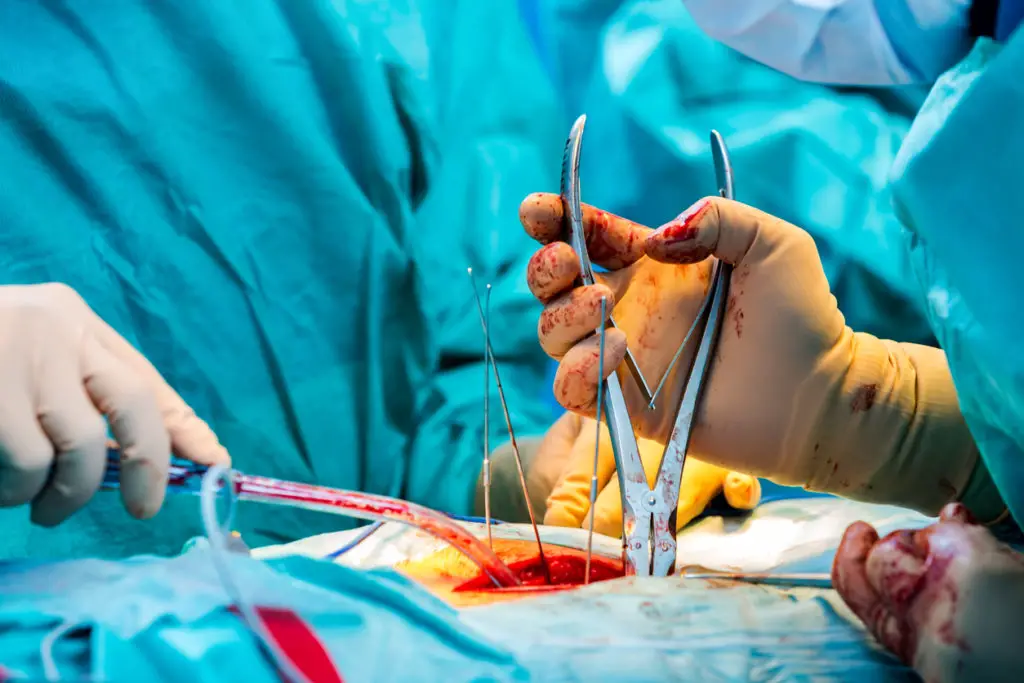Back pain, especially when it becomes chronic, can be debilitating.
For example, many give up their favorite sport after a herniated disc lumbar. The recurrent attacks are often traumatic, and one lives with the constant fear that one's back will give way at some point or another.
We therefore consult a neurosurgeon (or orthopedist, it depends) who tells us that he can operate on us. A small surgery at the lumbar level to relieve nerve pressure on the affected disc. Or surgery to fuse your L4-L5 vertebrae to stabilize the joint. Some operations even use technology that allows only very small incisions to be left. In short, after so much suffering, why not?!
Sorry, but the herniated disc is much more complex in the majority of cases…
Let me share in this article a list of 5 reasons (non-exhaustive) explaining why not operating a herniated disc is the best option in certain cases.
Note: Sometimes a herniated disc can cause symptoms that require urgent medical attention (such as cauda equina syndrome or other spinal cord compression). Although they require surgery, these conditions account for only a small proportion of herniated disc cases.
These isolated cases are usually associated with severe symptoms (such as weakness in the legs or urinary incontinence). A doctor will be able to tell you if your condition requires urgent medical (or surgical) intervention.
Why not operate on a herniated disc?
Here is a list of 5 reasons why you should think twice before considering surgery for a herniated disc.
Beforehand, I strongly urge you to find out about your condition via this popular article which explains in detail what a herniated disc is, and what natural solutions to consider in the first place:
Herniated disc from A to Z: Better understand your condition (symptoms and diagnosis)
1. Surgery often doesn't fix the real cause of your herniated disc
At first glance, one might think that the operation will finally solve the problem of herniated disc. But we must not forget that pain is multifactorial, and does not come purely from a biomechanical problem.
Worse still, many cases of disc herniation observed on medical imaging (such as an MRI or CT scan) are asymptomatic. This means that the person concerned does not feel any pain, despite the presence of a herniated disc!
Remember: if the pain came on gradually (like the majority of cases of herniated discs!), we can't assume that it can go away that quickly!
The precise causes of disc herniation are difficult to identify. We are even talking about hereditary and genetic factors that can explain several cases. Furthermore, it is believed that certain physiological or environmental factors can influence the hernia.
For example, muscular or joint imbalances can contribute to the problem (trunk muscles that are too weak, hips that are too stiff, etc.). Or else, bad postural habits or marked excess weight. Or, stress and lack of sleep which increase muscle tension and make the brain hypersensitive to pain.
And that, believe me, no surgery can fix that!
2. Surgery is not beneficial in the long term
There are numerous studies which demonstrate that surgery is not necessarily more advantageous than “conservative” therapies in the long term. (Chan et al 2011).
Worse still, in some rare cases, surgery can worsen pain and disability. We call it “failed surgery syndrome”!
Also remember that surgery only corrects the anatomy of the back (for example by nerve decompression by laminectomy, or by stabilizing the vertebrae by arthrodesis to reduce instability). If the real cause of the problem is poorly identified, it is very likely that the operation will not provide any benefit!
3. Surgery comes with its share of risks and complications
Logically, when someone uses a scalpel and all sorts of instruments to play behind your back, there are associated risks.
Although rare, possible post-operative complications are infections, deep vein thrombosis, pulmonary embolism, nerve damage, etc.
Obviously, the benefits of surgery outweigh the potential risks in the majority of cases, without which no doctor would perform surgery. But you still have to be sure that the surgery is worth it!
4. Surgery affects the human body
Imagine having surgery to fuse two lumbar vertebrae to relieve your back pain (for example by removing the disc between L4-L5 responsible for your symptoms). What do you think will happen with the overlying and underlying vertebrae in the future?
You guessed it, they will be used more to compensate for the lack of mobility in the merged segment. This can over time increase the stress on these vertebrae, which can develop dysfunction. Here is one of the many examples demonstrating a potential imbalance resulting from surgery…
5. Surgery encourages a passive attitude
I often say that it is by adopting a proactive approach that we will correct our back problem. If you think a doctor is going to fix everything while you're asleep on an operating table, you're wrong.
Now I can understand that some people are suffering greatly and running out of patience. You have to juggle your work, your entourage, your family... and your pain. On the other hand, be aware that surgery should be considered AS A LAST RESORT when you suffer from back pain! (unless it is an emergency situation and you have “red flag” symptoms).
If you are concerned that your condition may be serious, see the following article:
Back pain: When should you worry?
Conclusion (and alternative methods)
I hope you now understand why the operation should not be considered immediately when suffering from a herniated disc (even if your lower back pain seems severe!).
In an ideal world, you should have tried everything before considering lumbar surgery. For herniated discs, we generally start with medication and active physiotherapy focused on therapeutic exercises aimed at improving function (sheathing, breathing, etc.).
The Mckenzie method is often used to identify a preferred direction (a direction of movement to relieve pain and reduce other symptoms), as well as improve quality of life.
Analgesic treatments also help relieve pain and calm symptoms. We think, among other things, of heat, ice, osteopathy, alternative treatments and natural products, etc. In refractory cases, lumbar infiltration remains a possible option to reduce inflammation and relieve pain.
Note: For natural solutions to relieve back pain, see the following article:
How to relieve back pain? (36 answers)
In the presence of herniated disc, in addition to the pain, it is also necessary to consider the presence of irradiations and paresthesias in the lower limb. Even if back pain is incapacitating at the lumbar level, it is more the presence of pain in the thigh or calf (associated with tingling and numbness that will indicate an aggravation of the condition).
Let's end with these words: Fortunately, surgeries are not performed as frequently as in the past. If in doubt, your healthcare professional will be able to guide you through this complex process.
Resources
My name is Anas Boukas and I am a physiotherapist. My mission ? Helping people who are suffering before their pain worsens and becomes chronic. I am also of the opinion that an educated patient greatly increases their chances of recovery. This is why I created Healthforall Group, a network of medical sites, in association with several health professionals.
My journey:
Bachelor's and Master's degrees at the University of Montreal , Physiotherapist for CBI Health,
Physiotherapist for The International Physiotherapy Center


